#what is ketosis diet
Explore tagged Tumblr posts
Text
Ketogenic Diet for Beginners: Everything You Need to Know
The ketogenic diet is a low-carbohydrate, high-fat diet that has become increasingly popular in recent years. It is said to have a number of health benefits, including weight loss, improved blood sugar control, and reduced risk of heart disease.
In this article, we will take a comprehensive look at the ketogenic diet, including what it is, how it works, and what foods to eat and avoid. We will also discuss the potential benefits and risks of the ketogenic diet, and provide some tips for getting started.
What is the ketogenic diet?
The ketogenic diet is a very low-carb, high-fat diet that shares many similarities with the Atkins diet and the low-carb diet. It entails cutting back on carbohydrates significantly and substituting fat for them. When you cut back on carbohydrates, your body enters a metabolic state known as ketosis.
How does ketosis work?
The primary energy source in the body, glucose, is produced by the body when it consumes carbs. However, when you restrict your carbohydrate intake, your body cannot produce enough glucose to meet its energy needs. As a result, your body begins to break down stored fat into ketones, which are an alternative source of energy.
The body can use ketones, which are made in the liver, for energy, particularly in the brain. Your body burns fat more effectively for energy when it is in the ketosis state. This is one of the reasons why the ketogenic diet is so effective for weight loss.
#keto diet chart#keto diet for weight loss#keto diet what to eat#Ketogenic Diet#ketogenic diet plan#ketosis diet for weight loss#what is ketosis diet#what is the keto diet
0 notes
Text
How Atkins and the Keto Diet are Similar but Different
Low-carbohydrate diets have been gaining popularity in recent years due to their potential health benefits and effectiveness in aiding weight loss. Among the many low-carb diets, the Atkins and Keto diets are two of the most well-known. Although they share some similarities, there are also some significant differences between the two. In this article, we will explore the similarities and differences between the Atkins and Keto diets and help you decide which one is best for you.
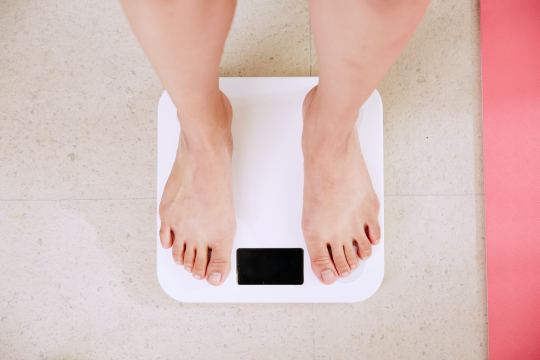
Introduction
The Atkins and Keto diets are two popular low-carb diets that have gained significant attention in recent years for their potential weight loss and health benefits. Both diets restrict carbohydrate intake and focus on increasing fat and protein consumption, but they differ in their approach to macronutrient ratios and overall health benefits. This article will explore the similarities and differences between the Atkins and Keto diets, as well as their potential risks and benefits. It will also provide tips for incorporating these diets into a healthy and sustainable lifestyle. If you want to learn more on the Keto Diet read Dr. Dexters Keto Guide for a more full overview of the keto diet and get keto tips.
Definition of low-carb diets
Low-carbohydrate diets are diets that restrict or limit the intake of carbohydrates, including sugars and starches, and focus on consuming protein and fat instead. The goal of a low-carb diet is to force the body to burn fat for fuel instead of glucose, which can lead to weight loss and improved health.
Importance of low-carb diets
Low-carb diets have been shown to have many potential health benefits, including improved blood sugar control, lower blood pressure, and reduced inflammation. They may also aid in weight loss and improve cardiovascular health.
Brief history of Atkins and Keto diets
The Atkins diet was developed by Dr. Robert Atkins in the 1960s and gained popularity in the 1990s. The Keto diet, on the other hand, is a more recent development, gaining popularity in the early 2010s. Both diets are based on the principles of low-carb eating, but they differ in their macronutrient ratios and other factors.
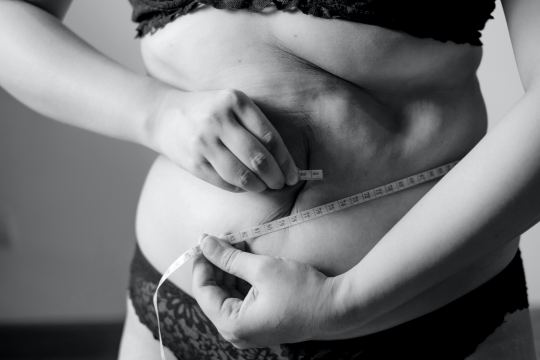
What is Atkins Diet?
The Atkins Diet is a low-carbohydrate diet that was popularized in the 1970s by Dr. Robert Atkins. The diet is based on the theory that limiting carbohydrates and increasing protein and fat intake will lead to weight loss and improved health. The Atkins Diet consists of four phases: induction, ongoing weight loss, pre-maintenance, and maintenance. During the induction phase, carbohydrate intake is limited to 20 grams per day. As the diet progresses, carbohydrates are gradually reintroduced.
Definition of Atkins diet
The Atkins diet is a low-carb, high-fat diet that is divided into four phases. The first phase, known as the induction phase, restricts carbohydrate intake to 20 grams per day and focuses on protein and fat consumption instead.
Phases of Atkins diet
The four phases of the Atkins diet are:
Induction: This phase restricts carbohydrate intake to 20 grams
Ongoing weight loss: In this phase, carbohydrate intake is gradually increased to find the optimal carb level for weight loss.
Pre-maintenance: This phase increases carbohydrate intake even further to prepare the body for maintenance.
Maintenance: This phase is the long-term maintenance phase where carbohydrate intake is increased to a sustainable level.
Foods to eat and avoid on Atkins diet
Foods that are allowed on the Atkins diet include meat, fish, eggs, cheese, vegetables, and healthy fats. Carbohydrate-rich foods like bread, pasta, and sugary foods are restricted.

What is Keto Diet?
The Keto Diet, short for ketogenic diet, is a low-carbohydrate, high-fat diet that aims to put the body into a state of ketosis. This is achieved by drastically reducing carbohydrate intake and increasing fat consumption. When the body is in ketosis, it burns fat for energy instead of carbohydrates. The diet has gained popularity for its potential benefits in weight loss, diabetes control, and improved mental clarity.
Definition of Keto diet
The Keto diet, also known as the ketogenic diet, is a very low-carb, high-fat diet that is designed to put the body in a state of ketosis. Ketosis is a metabolic state where the body burns fat for fuel instead of glucose.
Phases of Keto diet
There are no specific phases of the Keto diet. Instead, the focus is on maintaining a consistent state of ketosis by consuming a very low amount of carbohydrates.
Foods to eat and avoid on Keto diet
Foods that are allowed on the Keto diet include meat, fish, eggs, cheese, vegetables, and healthy fats. Carbohydrate-rich foods like bread, pasta, and sugary foods are strictly limited.
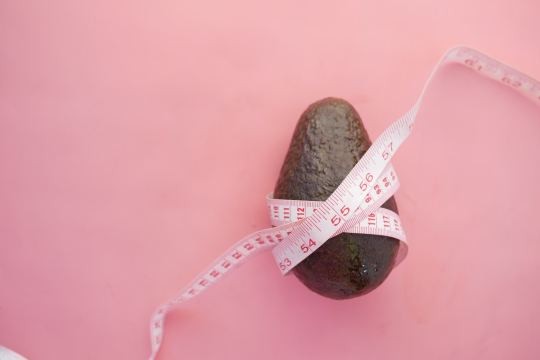
Comparison of Atkins and Keto Diets
Both the Atkins and Keto diets are low-carbohydrate, high-fat diets that aim to promote weight loss and improve health. However, the Keto diet is stricter in terms of carbohydrate intake and focuses on achieving ketosis, while the Atkins diet has four phases with varying carbohydrate levels. The Atkins diet may be more flexible but can lead to more gradual weight loss, while the Keto diet is more restrictive but can result in quicker weight loss.
Differences in macronutrient ratios
The Atkins diet typically has a higher protein intake than the Keto diet. The Keto diet is a very high-fat diet, with up to 75% of calories coming from fat, while the Atkins diet is a moderate-fat diet with around 40% of calories coming from fat.
Differences in carb intake
The induction phase of the Atkins diet restricts carbohydrate intake to 20 grams per day, while the Keto diet typically restricts carbohydrate intake to 20-50 grams per day.
Differences in protein intake
The Atkins diet typically has a higher protein intake than the Keto diet. This is because the induction phase of the Atkins diet focuses on high protein consumption.
Differences in fat intake
The Keto diet is a very high-fat diet, with up to 75% of calories coming from fat, while the Atkins diet is a moderate-fat diet with around 40% of calories coming from fat.
Differences in health benefits
Both diets have been shown to have potential health benefits, such as improved blood sugar control and weight loss. However, the Keto diet may have additional benefits for neurological conditions such as epilepsy.
Differences in weight loss results
Both diets have been shown to be effective for weight loss, but the Keto diet may lead to more rapid weight loss in the short term.
Differences in potential side effects
The Atkins diet may cause side effects such as constipation, bad breath, and high cholesterol levels. The Keto diet may cause side effects such as the "Keto flu," which is characterized by headaches, nausea, and fatigue.
Which Diet is Better for You?
Factors to consider when choosing a low-carb diet
When choosing a low-carb diet, factors to consider include personal health goals, lifestyle, and food preferences.
Pros and cons of Atkins diet
Pros of the Atkins diet include rapid weight loss and potential health benefits. Cons of the Atkins diet include potential side effects and a restrictive induction phase.
Pros and cons of Keto diet
Pros of the Keto diet include rapid weight loss and potential health benefits, especially for neurological conditions. Cons of the Keto diet include potential side effects and the restrictive nature of the diet, which may make it difficult to follow long-term.
Conclusion: Atkins vs Keto
While both the Atkins and Keto diets are low-carb diets that focus on weight loss and improving health, they have some key differences in their macronutrient ratios, carb intake, protein intake, and health benefits. Ultimately, the best diet for an individual will depend on their personal health goals, lifestyle, and food preferences.
FAQs
1. Can the Atkins and Keto diets be followed by vegetarians or vegans?
Both diets can be adapted for vegetarians or vegans, but it may require more planning and effort to ensure adequate protein intake.
2. Can the Atkins and Keto diets be followed long-term?
While both diets can be followed long-term, it is important to consult with a healthcare professional to ensure that the diet is meeting all nutritional needs.
3. Are there any risks associated with following a low-carb diet like Atkins or Keto?
There are potential risks associated with following a low-carb diet, such as nutrient deficiencies, constipation, and the potential for high cholesterol levels. It is important to consult with a healthcare professional before starting any new diet.
4. Can the Atkins and Keto diets be followed by people with diabetes?
Both diets may be beneficial for people with diabetes, but it is important to consult with a healthcare professional to ensure that the diet is properly managed and monitored.
5. Are there any foods that are allowed on one diet but not the other?
While there may be some differences in specific foods that are allowed or restricted on the Atkins and Keto diets, both diets focus on limiting carbohydrate intake and increasing healthy fat and protein consumption.
#atkins#ketodiet#ketorecipes#ketotips#lowcarb#low carb diet#banting#banting diet#ketosis#atkins diet#what is the atkins diet#keto#LCHF#Keto LCHF#weight loss#diet and health#diet advice#diet guide#tips for keto#low carb high fat#ketosis diet
4 notes
·
View notes
Text
The Benefits of Keto Meal.
Introduction to the Keto Diet
The Ketogenic diet, for short is a low carb, high-fat diet that aims at changing the body's fuel source from carbohydrates to fats. The metabolic state that results from burning fat for energy is termed ketosis; it results from the burning of fat for energy in the production of ketones.
Why people use the keto diet
1. Weight Loss: burn fat efficiently through the reduction of carbohydrate intake.
2. Blood Sugar Management: the keto diet can stabilize glucose and insulin levels.
3. Cognitive Benefits: many claim improved Focus and mental clarity.
4. Energy Boost: Ketones provide a reliable energy supply, and there will be no sugar crash.
The central keto diet principle is to have about 70% of fats, 20-25% proteins, and 5-10% carbs.
Benefits of Keto Meal
Long term Weight Loss A keto meal is a very effective method in controlling hunger because insulin is stabilized.
You can keep your appetite for much longer time, and your blood sugar rollercoaster ride prevents cravings because you tend to lose less weight if your diet is fluctuated with constant sugar level peaks and drops. Sharp Brain Function and Focus Ketones are a supply of energy for the brain stable source of. Unlike carbohydrates whose level fluctuate constantly throughout the day; hence, there is neither morning mental fog nor depression or brain fuziness.
Improved Blood Glucose Control Ketogenic diet meals help subjects of type 2 diabetics or in-insulin resistance by ensuring lessened blood glucose. Furthermore, insulin sensitivity goes better since there exists lower levels of carbohydrates input, thereby reducing quick jump of blood sugar rate in the blood that sometimes is hazardous to bodies as they cause very risky levels of blood Sustained Energy Endurance Fat is one good energy source compared with carbs.
Many Dieters have experienced constant stream levels of energy to flow during their entire lifetime the day without the mid-afternoon crash. Reducing Inflammation Low-carb diets are correlated with decreased levels of chronic inflammation. Most people find relief from issues like joint pain and migraines when adopting a low-carb lifestyle. How to Live Keto Meal Planning
Calculate Your Macros:
Use a keto calculator to adjust fat (70%), protein (25%), and carbs (5%) based on your needs.
Healthy Fats:
Avocado, olive oil, fatty fish, and nuts are the best sources.
Personalized Protein Intake:
Determine protein intake based on activity level. Add eggs, chicken, beef, seafood, or tofu.
Limit Carbs Wisely:
Use leafy greens, zucchini, and berries to reach less than 20-50g of net carbs per day.
Plan Snacks and Treats:
Prepare nuts, cheese, dark chocolate, or boiled eggs for a fast snack.
Adapt to Restrictions Modify for vegan, dairy-free, or gluten-free needs by adjusting ingredients.
HERE ARE 2 RECIPE FOR YOU
RECIPE 1:
Keto Avocado Chicken Salad
Ingredients:
-2 large avocados
-1 grilled chicken breast, shredded
-1/4 cup red onions, chopped
-1/2 cup cherry tomatoes, halved
-2 tablespoons olive oil
-Juice of 1 lime
-Salt and pepper to taste
Instructions:
1. Prepare the Chicken: Grill or pan-sear the chicken breast until fully cooked. Let it cool and shred.
2. Mix the Ingredients: In a large bowl, combine the avocados (diced), shredded chicken, red onions, and cherry tomatoes.
3. Dress the Salad: Drizzle olive oil and lime juice over the mixture.
4. Season: Add salt and pepper to taste. Toss well.
5. Serve: Can be eaten as is or served on keto bread for a light sandwich.
Nutritional Info (Per Serving):
Calories: 400
Fats: 30g
Protein: 20g
Net Carbs: 5g
I HAVE A FREE E-BOOK FOR YOU. CLICK HERE TO DOWNOAD
RECIPE 2:
Ingredients:
-2 salmon fillets
-2 tablespoons unsalted butter
-3 garlic cloves, minced
-1/4 cup heavy cream
-1/4 cup chicken broth
-1 bunch of asparagus, trimmed
-Salt and pepper to taste
-1 tablespoon fresh parsley (optional)
Instructions:
Cook the Salmon: In a large skillet, heat 1 tablespoon of butter. Season the salmon with salt and pepper, and sear for 3-4 minutes on each side. Remove from skillet.
1.Cook the Salmon: In a large skillet, heat 1 tablespoon of butter. Season the salmon with salt and pepper, and sear for 3-4 minutes on each side. Remove from skillet.
2. Make the Garlic Butter Sauce: Add the remaining butter to the skillet. Saute garlic until fragrant, then pour in chicken broth and heavy cream. Simmer for 2-3 minutes.
3. Add Asparagus: Place the asparagus in the skillet and cook for 5 minutes, stirring occasionally.
4. Combine: Return the salmon fillets to the skillet, spoon the sauce over them, and cook for another 2 minutes.
5.Serve: Garnish with parsley, if desired, and enjoy!
TO KNOW MORE ABOUT KETO......CLICK HERE
#keto diet#ketogenic#ketorecipes#keto#lowcarb#high protein#ketosis#weight loss#i want to lose weight#weight goals#weight management#weight loss journey#diet#tw weight#weight loss diet#calories#bodybuilding#low cal diet#fat loss#what i eat in a day#a4a diet#healthylifestyle#health and wellness#health & fitness#healthcare#nutrition#mental health#medicine#fitness#athletic
1 note
·
View note
Text
The Science Behind the Keto Diet 🥑🔥
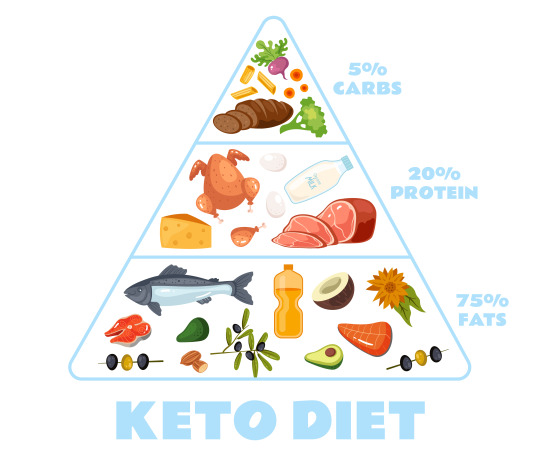
Fat Burning: "The keto keyword is designed to shift your body's primary fuel source from carbohydrates to fats," explains Dr. Jeff Volek, a registered dietitian. "By restricting carbohydrates and increasing fat intake, your body enters a state of ketosis, where it burns fat for fuel instead of glucose." Say hello to your body's new fat-burning mode! 🔥🔥
Weight Loss: Dr. Eric Westman, a leading expert in low-carb diets, highlights the weight loss benefits of the keto keyword. "Studies have shown that the keto diet can lead to significant weight loss, particularly in the form of body fat," he says. "By reducing insulin levels and promoting fat burning, keto can help you shed pounds and inches." Get ready to say goodbye to stubborn fat and hello to a slimmer, healthier you! 💪🏼⚖️
Stable Energy: "One of the benefits of the keto keyword is stable energy levels throughout the day," notes Dr. Dominic D'Agostino, a researcher in metabolic therapies. "By using fat for fuel, rather than relying on frequent carbohydrate intake, you can experience more consistent energy levels and avoid the highs and lows of blood sugar spikes." Say goodbye to energy crashes and hello to sustained vitality! 🌟💥
Mental Clarity: Dr. David Perlmutter, a neurologist and author, emphasizes the cognitive benefits of the keto keyword. "Ketones, the byproducts of fat metabolism, are a preferred fuel source for the brain," he explains. "Following a ketogenic diet can enhance mental clarity, focus, and cognitive function." Get ready to sharpen your mind and unlock your brain's full potential! 🧠🔑
Appetite Control: "The keto keyword can help regulate appetite and reduce cravings," says Dr. Ethan Weiss, a cardiologist. "The high-fat, moderate-protein, low-carb approach can lead to greater satiety and a reduced desire to overeat, making it easier to stick to your dietary goals." Say goodbye to constant hunger pangs and hello to feeling satisfied and in control! 🥑🍔
#keto diet#keto#keto diet for beginners#ketogenic diet#keto diet plan#diet#keto diet explained#what is the keto diet#low carb diet#keto meals#keto recipes#keto food#keto diet rules#keto diet guide#keto diet review#doctor keto diet#is keto diet safe#keto diet results#tips for keto diet#what ketogenic diet#what is keto#ketosis diet#what is ketogenic diet#how to do keto#ketogenic diet explained#ketogenic diet foods
1 note
·
View note
Text
Keto Trim - Loss Weight Without Diets And Exercises
#keto diet#keto#what is keto diet#ketosis#keto supplements#keto diet pills#best keto supplements#carb blocker#weight loss#keto diet for women#health tips
0 notes
Note
My mom has gone full on Youtube Woo "natural cures" and I have no idea how to get through to her. Literally sitting at home in front of the tv playing video after video of pseudoscientific bunk and lapping it up... She's diabetic and a cancer survivor and I fear she's gonna do irreparable damage in her forays into the deep end...
Do you have any tips on reaching folks that are in this deep?
Regular reinforcement of evidence-based medicine as kind as you can make it whenever it comes up.
"Oh I heard about this coffee enema thing..." "There's not really any evidence to back that up, mom, and besides, it sounds pretty unpleasant."
"Oh I heard about how nightshades are poison" "That book doesn't have a lot of great evidence, plus here are the kinds of micronutrients that you can get from nightshades, they're important in your diet."
"Oh I'm not sure about vaccines anymore, the new ones are so scary" "Mom, I'm so glad you got me vaccinated, I think about how kids younger than me are at risk of measles and other issues because of vaccine hesitancy and I worry so much for them, I think you made the right decision when I was a kid and I'm grateful for it."
"Oh, but fluoride in the water can cause IQ losses in young children," "Mom, those studies aren't in areas where fluoride is added, they're in areas where it's naturally high and are way, way above what gets added here, plus look at you and me, we have been drinking fluoridated water and we're both smart."
IDK, it's miserable. Basically you go on natural news and learn about all the lies, then spend twenty times as much time learning about the debunkings for all the lies and then try to be nice when you tell them they're wrong.
Since your mom has had previous successful treatment from allopathic doctors call back to that; "but mom I'm so glad they were able to take care of your cancer - I know it was hard but I think you might not have survived if you hadn't trusted your doctors." "but mom, look at how much the medical science on diabetes has improved in your lifetime; i'm glad it's easier to manage now than it was when you were younger, and that there are better treatments being developed all the time; I don't think they're hiding things from us otherwise they'd still treat diabetes and cancer like they did in the 50s, and things are so much better than that."
Just. Try to be nice. Try not to attack her. Try to keep it light and offer cheerful arguments before changing the subject.
You don't want her to get defensive, you want her to consider you to be someone she can ask for information who won't make fun of her and doesn't think she's stupid.
Anyway. Life with my mother in law has been fun recently. She watched a youtube video and decided she must have gone into ketosis after fasting for twelve hours so she ordered a bunch of protein strips and I'm cooking for her a few times a week to guarantee that she's eating something other than canned chili beans.
So. You know. I feel you.
443 notes
·
View notes
Note
What is your normal grocery list? I’m about to be living at a dorm and I am looking for stuff to stock up on, I can’t really keep frozen foods though
i actually dont even cook all that much so i dont keep a lot of frozen foods either. this is my regular list when i go, usually weekly.
FASTING FOODS
okay so youre probably like. raine you arent supposed to eat anything when you fast. hear me out bc this is how i consistently fast a 20-4 schedule everyday, with a lot less binges than before, AND getting all of the benefits of fasting. and yeah, i still binge from time to time, but my binges are far less because my stomach actually cannot handle being fed over 1000 calories anymore, especially not all at once.
these are my ESSENTIALS so theyre pretty much the only things i consistently buy weekly.
cucumbers
chicken broth (0cal kind)
seaweed snacks
pickled ginger
tea (any, but i like trying new flavors ! my favorite is lemon ginger because it helps digestion, and green tea because it speeds up your metabolism. also a lot healthier than diet coke with the same amount of caffeine, also less likely to spike your blood sugar and kick you out of ketosis- which will make your cravings for food much worse)
...dont get me wrong i couldnt live without diet coke. but sometimes ill go for the healthier option.
why i eat these foods while i fast
these are foods that have extremely low cals and carbs (like less than 2 grams per/serving) so they wont kick you out of ketosis (which is the major benefit to fasting, where your body burns fat at a higher rate). when youre in ketosis, your body stops sending you as many cravings, which is why sometimes it feels easier to fast 24 hours after you last ate as opposed to 3 hours.
because i spend the majority of my time fasting, (and i would never be able to do that without these foods) i go through these items pretty quick.
but otherwise i only have to buy other healthy foods on a biweekly or even monthly basis, because i wont eat them as fast ! heres some things i rotate through depending on how sick of them i am lol.
regular food
built bars - essential for me. tons of protein, less sugar than other bars, and relatively low cal.
somebody on here introduced me to these and im soo glad they did. i dont remember who but if youre seeing this ilysm.
tuna creations packets - rly good for on the go, tons of flavors, lots of protein so they're really filling for only being 70-90cals depending on the flavor
blueberries + apples - so hard to over eat these two items, plus fiber
rice cakes - self explanatory
pistachios or sunflower seeds - great for curbing hunger, but im a little sick of them rn
a low cal air popped popcorn - i forget which brand i have rn, but its pretty good and has a lot of fiber.
chobani yogurt + yogurt protein drinks (50cal) - the fact that these r 50cals amaze me for how good they taste. the yogurt drinks are my favorite bc theres actually a shit ton of protein and taste pretty good without actually having to make myself a protein shake. the cookies and cream and peaches and cream are my favorites ive tried. good for breaking a fast with.
thats all i can think of atm ! sry for the fucking essay i hope this was a little helpful at least.
typing this out manically made me realize im a little crazy. i cant say with my whole chest that you should listen to me and my d1sordered thoughts, but i think everyone on here knows that already so... uh
please be kind to yourselves. take ur vitamins (even while fasting) i genuinely love you all every one of you fucked up bitches like me.
goodnight <3
#a4a diary#tw a4a#a4a motivation#a4a#a4a buddy#a4a coach#a4a tips#st⭐️rve#light as a feather#⭐️rving
24 notes
·
View notes
Note
Wait, I'm so sorry. You don't have to, of course, but can you explain the keto/ketosis/cutting thing? I though I kinda knew what keto was but some of the language/specifics confuses me.
they’re the same thing a teeny bit in that keto diet forces the body into ketosis but the main difference is that on keto you’re trying to go into a a permanent state of ketosis.
ketosis is the metabolic process in which the body burns fat storage instead of carbohydrates, so by not eating carbs you can force this process to happen. someone who works out a lot will go through phases of bulking (eating a lot of calories and carbs so that their body can use that energy to create a lot of muscle) and cutting (forcing the body into ketosis so that the excess fat is burned and the muscle they’ve just built is very visible and toned). the main idea is that they only temporarily cut the carbs (because carbs are GOOD and you NEED THEM)
someone on keto will be not eating carbs in a long term way and in a constant state of ketosis so that their body is always burning fat storage instead of using carbs for energy. this is a shit diet because as soon as you bring carbs back into the diet you’re just going to gain the weight back! plus the fact that you’re depriving your body of a NECESSARY macromolecule. don’t believe keto propaganda.
44 notes
·
View notes
Text
The Ketogenic Diet: A Detailed Beginner’s Guide to Keto

What is the Ketogenic Diet?
The ketogenic diet (keto) is a low-carb, high-fat diet that shifts the body's metabolism into a state called ketosis. In ketosis, the body burns fat for energy instead of carbohydrates, leading to increased fat loss, improved energy levels, and other health benefits.
How Does Keto Work?
Normally, your body relies on carbohydrates (glucose) for energy. When you reduce carb intake significantly, the body enters ketosis, where it breaks down fat into ketones for fuel. This metabolic shift can take a few days to a week.
Types of Ketogenic Diets
Standard Ketogenic Diet (SKD) – 70% fat, 20% protein, 10% carbs.
Cyclical Ketogenic Diet (CKD) – Alternates between keto days and higher-carb days.
Targeted Ketogenic Diet (TKD) – Allows for additional carbs before workouts.
High-Protein Ketogenic Diet – 60% fat, 35% protein, 5% carbs.
Health Benefits of Keto
Weight Loss – Increased fat burning and reduced hunger.
Improved Mental Clarity – More stable energy levels and focus.
Blood Sugar Control – Helps manage insulin and blood sugar levels.
Increased Energy & Endurance – Stable fuel source without carb crashes.
Supports Heart Health – Can improve cholesterol and blood pressure.
Foods to Eat on Keto
Foods to Avoid
🚫 Sugary Foods – Soda, candy, desserts. 🚫 Grains & Starches – Bread, pasta, rice. 🚫 High-Carb Fruits – Bananas, apples, grapes. 🚫 Legumes – Beans, lentils, chickpeas. 🚫 Processed Foods – Fast food, processed snacks.
Common Side Effects (Keto Flu & How to Fix It)
Keto Flu – Fatigue, headaches, nausea (fix: drink water, increase electrolytes).
Constipation – Lack of fiber (fix: eat more leafy greens & fiber-rich foods).
Bad Breath – Acetone in breath (fix: stay hydrated, chew sugar-free gum).
Tips for Success on Keto
✔ Track Your Macros – Keep carbs under 50g per day. ✔ Stay Hydrated – Drink plenty of water. ✔ Increase Electrolytes – Get enough sodium, potassium, and magnesium. ✔ Meal Prep – Plan keto-friendly meals in advance. ✔ Be Patient – It takes time to adapt to ketosis.
click here to buy keto: https://shorturl.at/KQeEi
#weight loss#healthcare#mental health#health & fitness#the heart killers#headcanon#fitness#keto#ketorecipes#ketogenic#ketodiet
2 notes
·
View notes
Text
still trying to get the hang of keeping my blood sugars in range with diet.
turns out that eating dinner later and not having a snack before bed is producing better fasting numbers. but now my dinner numbers are spiking out of range
it's just so frustrating to feel afraid of eating because i don't know what will work or not. and i can't just cut out carbs because then i might enter ketosis, which is also bad for the baby. and the more stressed i get, the harder it is to even eat because my anxiety spikes and triggers my gag reflex when i try to swallow food. so that's extra fun
#life post#i was doing so well with my meal numbers too#and apparently insulin resistance can continue to get worse until week 34#and then it might improve
2 notes
·
View notes
Text
I want someone, who knows how to write angst better than me, write a fic where Buck is sure that Tommy got back to him is temporary till he will find someone better. Because that what Tommy basically told him during break up right? He had no enough experience and Tommy wants someone with better experience and someone who's better in everything. But he tries hard to be perfect. Do what he never did in relationship, basically always in his best possible
But he breaks. Because he burned out. Because it's not him and his tired. He is always not enough because people need someone else. Another son, another man (Tommy himself for Abby and as Buck thinks Tommy wants someone better). And he just breaks
And it's not Tommy's fault. Buck just was using his best qualities and stopping his worst, always keeping himself in check, changing his actions. But it's hard. When you try to keep a mask for too long it takes all the energy from you
If you want it to make even better you can use hints about Buck's possible hard relationships with food when he always tries to be on his best possible. He was loosing fat at least in 3 seasons. We know he was on ketosis too. So Buck keeping diet to basically start to starve himself eventually can be so good
6 notes
·
View notes
Text
Keto Waffles with Almond Flour and No-Sugar Vermont Syrup: A Delicious and Healthy Choice
If you’re following a keto diet, you know that finding tasty, low-carb alternatives to your favorite foods can be a challenge. But what if you could enjoy a classic breakfast staple—waffles—without sacrificing your health goals? With almond flour and no-sugar Vermont syrup, you can make delicious keto waffles that not only taste great but offer several health benefits. Here’s how, plus why they’re a great choice for your diet.
Recipe for Keto Waffles with Almond Flour
Ingredients:
• 1 cup almond flour
• 2 large eggs
• 1/4 cup unsweetened almond milk (or any low-carb milk alternative)
• 1 teaspoon baking powder
• 1 teaspoon vanilla extract
• 2 tablespoons melted butter (or coconut oil for dairy-free)
• A pinch of salt
• No-sugar Vermont syrup (for topping)
Instructions:
1. Preheat your waffle maker.
2. In a bowl, mix the almond flour, baking powder, and salt.
3. In a separate bowl, whisk the eggs, melted butter, vanilla extract, and almond milk until smooth.
4. Combine the wet ingredients with the dry ingredients, mixing until well blended.
5. Pour the batter into the preheated waffle maker and cook according to the manufacturer’s instructions (usually 3-4 minutes).
6. Serve your waffles hot, drizzled with no-sugar Vermont syrup, and enjoy!
Health Benefits of Keto Waffles
1. Low in Carbs, High in Healthy Fats
Almond flour is naturally low in carbohydrates and high in healthy fats, making it an ideal ingredient for keto recipes. It helps you stay in ketosis while providing essential fatty acids that support heart health and brain function.
2. Rich in Protein
Eggs and almond flour both provide a good amount of protein, helping you feel fuller for longer. This can help curb cravings and reduce snacking throughout the day, supporting your weight loss goals.
3. Packed with Nutrients
Almond flour is a nutrient-dense alternative to traditional flour. It’s rich in vitamins and minerals like vitamin E, magnesium, and manganese, all of which contribute to overall health, including better skin, bone, and immune system function.
4. No Added Sugars
Using no-sugar Vermont syrup ensures you’re avoiding the spike in blood sugar that comes with traditional syrups. Many sugar-free syrups are sweetened with alternatives like monk fruit or stevia, which don’t affect blood glucose levels, making them perfect for keto.
5. Gluten-Free
Almond flour is naturally gluten-free, which can improve digestion and reduce inflammation in people sensitive to gluten or those with celiac disease. It’s also a more gut-friendly option for many who experience bloating with regular wheat flour.
6. Supports Weight Loss
By keeping your carb intake low and promoting a feeling of fullness, these keto waffles can help support weight loss. Almond flour is a low-glycemic ingredient, meaning it has a minimal impact on blood sugar, which helps prevent insulin spikes that can lead to fat storage.
7. Improved Energy Levels
The healthy fats and protein in these waffles provide a steady energy supply, unlike traditional carb-heavy waffles that often lead to energy crashes after eating. You’ll feel more alert and energized throughout your day.
Final Thoughts
Keto waffles made with almond flour and topped with no-sugar Vermont syrup are not just a tasty breakfast—they’re a powerhouse of nutrition that supports your keto lifestyle. With fewer carbs, plenty of healthy fats, and a host of vitamins and minerals, they’re a perfect way to start your day without derailing your progress. So go ahead, indulge in these waffles guilt-free, and enjoy the health benefits they bring!
#keto#ketofriendly#ketoweightloss#ketorecipes#male#keto diet#before and after#man#lowcarb#waffles#breakfast
2 notes
·
View notes
Note
Hello again it's me sorry if I'm being annoying I'm just so tired of doctors and want to take my health into my own hands. Anyways I recently took your advice but only ate sardines,eggs, saltwater, tea and regular water without meat (couldn't afford it currently) and to make a long story i felt like actual garbage I had night and day palpations, dizziness, fatigue, irritable mood swings, heavy breathing, leg cramps and so fourth ,But then I ate garbage (McDonald) and woke up without palpations and had good sleep like wtf??? So yeah I guess my body is too accustomed to garbage so I have to gently ween myself off of it before I try anything new anyways thanks again for all the advice and sorry again for being annoying..
(Not relevant but I had to fish sandwiches and a few sips of a vanilla milkshake)
That sounds pretty spot on for transition symptoms. If you are coming from a carbohydrate-heavy diet into a zero carb diet, your body will be forced into ketosis, which is the metabolic state of utilizing fatty acids to produce ketones in the liver, which are then burned for energy by the body. When you eat carbs, your body will never use fatty acids for energy and will instead just store them, and you will always be in a state of glycolysis, or carb-burning. Most modern people have been in glycolysis for almost their entire lives, as only breastfed babies stay in ketosis, and then that ends once they start eating the carb-based modern diet. Because of this, lack of use means that your body doesn't know how to make and utilize ketones efficiently. It has to learn how to do this, which can take as little as four days or as long as two weeks, depending on the individual.
During that time where the body is acclimating to this new way of functioning, you can feel all sorts of awful. This transition period is most commonly known as "keto flu." It ranges in symptoms. Everything you experienced is a symptom, and a couple others include skin rashes, nausea and diarrhea. Essentially the body is flipping out trying to figure out how to use this new fuel source, and at first it will be bad at it. But don't worry, those symptoms are transient and they won't do any long term damage to you. However, if you find them to be unbearably severe, what you can do instead is back off and transition into the diet slowly. Keep your carbs, but increase your animal-based food intake, and over a period of time start reducing your carbs while increasing your meat intake. It can help minimize the negative effects.
Also, lots of fat and electrolytes are your friend.
I would highly recommend looking into the videos of Dr. Ken Berry, Judy Cho, and Bella the Steak and Butter Gal on youtube. They have lots of overview videos with tips/tricks, advice, and pitfalls to avoid when starting the diet or trying to make adjustments to optimize it. Between them they have far more knowledge than I do. Not to say I don't like answering questions, but I want to make sure you're in the best hands possible :)
4 notes
·
View notes
Text
discover the secrets of a keto meal plan
Discover the Benefits of a Keto Meal Plan
Introduction The keto diet has gained popularity in recent years, and for good reason. For many, a keto meal plan offers an effective way to lose weight and feel more energized. This diet focuses on low carbohydrate intake and high fat consumption, putting the body into a state of ketosis. In this blog post, we will explore the benefits of a keto meal plan and how it can help you achieve your health goals.
What Is a Keto Diet and How Does It Work? The keto diet, or ketogenic diet, is a nutritional pattern that significantly reduces carbohydrate intake while increasing fat consumption. Under normal circumstances, the body primarily derives energy from carbohydrates, but on a keto diet, carbohydrate intake is limited to about 20-50 grams per day. This substantial reduction in carbs forces the body to use fat as its primary energy source, leading to a metabolic state known as ketosis. During ketosis, the liver produces ketones from stored fat, which then serve as an alternative energy source for the body and brain.
The idea behind this diet is to shift the body from burning glucose, derived from carbohydrates, to burning fat. This process can take several days, depending on your metabolism and activity level. During this transition period, your body may adapt to the new energy source, which can sometimes come with temporary side effects like fatigue or irritability, commonly referred to as the "keto flu."
An essential aspect of the keto diet is that it's not just about limiting carbohydrates, but also about consuming enough healthy fats and a moderate amount of protein. This ensures that the body remains effectively in ketosis and functions optimally. Typical foods that fit within a keto diet include avocados, nuts, seeds, fatty fish, meat, eggs, and oils like olive oil and coconut oil. By training your body to use fat as fuel, various health benefits can be achieved.
The Key Benefits of a Keto Diet for Weight Loss One of the most notable benefits of a keto diet is its effectiveness for weight loss. By limiting carbohydrates and increasing fat intake, the body switches to a fat-burning mode. This often leads to quicker weight loss, especially in the early stages of the diet. An additional benefit is that many people experience less hunger, making it easier to maintain a caloric deficit without feeling constantly deprived.
Moreover, the keto diet helps stabilize blood sugar levels, preventing spikes and fluctuations. This can lead to a reduction in fat storage, particularly around the abdominal area. Studies have shown that individuals following a keto diet often lose more body fat than those on a traditional low-fat diet.
Another interesting aspect is that the keto diet lowers insulin levels. Since insulin plays a significant role in fat storage, lower insulin levels can contribute to more efficient fat burning. Additionally, the increased fat and protein intake helps preserve muscle mass during weight loss, which is crucial for a healthy metabolism.
Finally, the keto diet offers a wide variety of foods rich in healthy fats and proteins, contributing to a feeling of fullness and reducing cravings. This can help lower overall calorie intake and promote weight loss without a sense of deprivation.
Improved Energy and Mental Clarity from Keto Many people following a keto meal plan report improved energy and mental clarity. When the body uses ketones as its primary energy source, energy fluctuations decrease, leading to a more consistent energy flow throughout the day. Additionally, ketones can fuel the brain more efficiently than glucose, resulting in improved focus and cognitive performance. This makes the keto diet particularly appealing for those seeking a mental boost.
Alongside a more stable energy level, many experience less "brain fog" and increased alertness. This is especially beneficial for individuals with demanding jobs or studies that require sharp focus and clear thinking. The reduction in sugar intake also plays a role in these improvements, as sugar crashes are often accompanied by fatigue and loss of concentration.
Moreover, certain ketones, such as beta-hydroxybutyrate, have anti-inflammatory properties, offering further benefits for brain function. These ketones help protect brain cells and may even reduce the risks of neurodegenerative diseases.
The feeling of increased mental clarity and energy makes it easier to perform daily tasks and can contribute to an overall sense of well-being. For many, this is a key motivation to stick with a keto meal plan.
Keto Meal Plan: Examples and Daily Schedules A typical keto meal plan revolves around meals rich in healthy fats, moderate amounts of protein, and very low carbohydrates. For breakfast, you might enjoy an omelet filled with cheese, mushrooms, and avocado. Another tasty option is Greek yogurt mixed with chia seeds and a handful of nuts.
For lunch, you can prepare a salad with spinach, grilled chicken, avocado, and a dressing of olive oil and lemon juice. An alternative could be a lettuce wrap filled with turkey, bacon, and a thin layer of mayonnaise.
Dinner might consist of a piece of grilled salmon with creamy cauliflower puree and roasted Brussels sprouts. Other delicious choices include chicken with pesto and zucchini noodles, or a juicy steak served with sautéed asparagus in butter.
Snacks are also important within a keto meal plan. Popular options include a handful of almonds, cucumber slices with hummus, or a few slices of cheese with olives. For a sweet treat, you can enjoy a serving of berries with sugar-free whipped cream.
Planning your meals is essential to remain in ketosis and ensure your body receives all the necessary nutrients. Try to vary your food choices to avoid monotony and to get different vitamins and minerals. By being creative and flexible in your food preparation, you can enjoy delicious and satisfying meals while adhering to your keto diet.
Important Considerations and Possible Side Effects of Keto While the keto diet offers many benefits, there are also some things to keep in mind. The first few days of a keto diet can come with some discomforts, such as headaches, fatigue, nausea, and dizziness, often referred to as the "keto flu." These symptoms are usually temporary and can be alleviated by staying well-hydrated and ensuring adequate intake of electrolytes like sodium, potassium, and magnesium.
Another concern is the potential increased strain on the kidneys with a high protein intake. While the keto diet emphasizes a moderate protein intake, it's essential not to overdo it. Individuals with pre-existing kidney issues should exercise caution and seek medical advice before starting a keto diet.
Constipation can also be a problem for some people due to possibly lower fiber intake. This can be countered by including plenty of fiber-rich, low-carb vegetables like broccoli and spinach in your diet and drinking enough water.
Furthermore, it’s crucial to be mindful of the quality of fats you consume. It’s advisable to prioritize healthy fats like olive oil, avocado, and nuts over saturated and trans fats.
Lastly, some people may experience elevated cholesterol levels while following a keto diet. While this isn't necessarily harmful, it's wise to have your cholesterol levels checked regularly, especially if there is a family history of cardiovascular disease.
Clearly, a keto diet comes with several important considerations. By being well-informed and monitoring any side effects, you can maximize the benefits of a keto meal plan.
Maintaining a Keto Lifestyle Long-Term Maintaining a keto lifestyle long-term requires a combination of planning, flexibility, and adaptation. Regularly evaluating your progress can help you make necessary adjustments to your diet and activity levels, ensuring you continue to reap the benefits of keto. Flexibility also plays a crucial role; some people incorporate occasional carbohydrate-rich meals, known as carb-cycling, to make social situations easier and avoid monotony. This can help maintain the diet longer without feeling restricted.
To consistently remain in ketosis, it's important to plan meals ahead and consciously choose foods rich in healthy fats and low in carbohydrates. Sufficient variety in your meals not only prevents boredom but also ensures you get all the necessary nutrients. Additionally, it can be beneficial to try new keto recipes and develop your cooking skills.
Social support is another important element. Share your goals and challenges with friends or family, or join an online community of like-minded individuals. This can motivate you and help you stay focused during your keto journey.
Finally, it’s essential to listen to your body and seek professional medical advice if needed. By following these steps, you can sustainably and healthily integrate a keto lifestyle into your daily routine.
FREE KETO MEAL PLAN IN LINK BELOW https://www.claudiacaldwell.com/oto-uf61a?el=splittest-1214-bradflow-control#aff=affiliateking333
#food #healthy #healthylife
#artists on tumblr#free palestine#bill cipher#deadpool and wolverine#dipper pines#dungeon meshi#epic the musical#formula 1#gravity falls#hatsune miku
3 notes
·
View notes
Text
The Ultimate Keto Meal Plan: A Beginner's Guide to Healthy Eating and Weight Loss
The ketogenic diet, sometimes referred to as the "keto diet," has gained popularity as a means of promoting weight loss, increasing energy, and enhancing general health. Eating a lot of fat, moderate quantities of protein, and very little carbs is part of this diet. The idea is to get your body into a state known as "ketosis," when it burns fat for energy rather than carbohydrates. This article offers a comprehensive overview for anyone wishing to begin the keto diet, along with a simple and efficient meal plan to assist them reach their health objectives.
What is the Keto Diet?
The keto diet is a high-fat, low-carb diet that has been demonstrated to help with blood sugar regulation, weight loss, and cognitive performance. When you cut back on carbohydrates significantly and replace them with fat, your body goes into a condition of ketosis. Your body becomes extremely adept at burning fat for energy when it is in ketosis. Additionally, it causes the liver to produce ketones from fat, which are a fantastic source of energy for the brain.
Get The Ultimate Keto Meal Plans Buy Now
Here’s a breakdown of the standard keto diet:
- **70-75% Fats**: The keto diet's mainstay is healthy fat. They aid in the ketosis process, provide you energy, and keep you full. - **20–25% Protein**: Maintaining and repairing muscle requires a moderate protein intake. - **5–10% Carbohydrates**: Your body is encouraged to burn fat for energy by consuming less carbohydrates.
Get
Benefits of the Keto Diet
There are benefits to the keto diet beyond weight loss. It provides a number of health advantages: 1. Weight reduction: Your body must burn fat reserves for energy when you consume fewer carbohydrates, which causes weight reduction. 2. Enhanced Mental Clarity: The brain uses ketones as a potent fuel source, which helps with attention and concentration. 3. Stable Energy Levels: A lot of people report having consistent energy levels all day long without the highs and lows brought on by sugar and carbohydrates. 4. Reduced Appetite: Because high-fat foods are highly satisfying, they may help cut down on overall calorie consumption and appetite. 5. Better Blood Sugar Control: People with type 2 diabetes can benefit from the keto diet's ability to control and stabilize blood sugar levels.
Items to Take and Leave Out of Your Keto Diet Knowing what foods you may and cannot eat on a ketogenic diet is essential for successful ketogenic eating.
which to avoid.
#### Foods to Eat
- **Meats**: lamb, turkey, pig, chicken, and beef. - **Fat Fish**: Sardines, mackerel, trout, and salmon. - **Eggs**: Whole eggs, ideally free-range or organic. - **Healthy Fats and Oils**: butter, ghee, avocado, coconut, and olive oils. **Nuts and Seeds**: Flaxseeds, chia seeds, walnuts, and almonds. Leafy greens, broccoli, cauliflower, zucchini, bell peppers, and mushrooms are examples of **Low-Carb Vegetables**. - **Cheese**: Goat cheese, mozzarella, brie, cheddar, and more. **Avocados**: Low in carbohydrates and high in good fats. - **Berries**: Blueberries, raspberries, and strawberries (partially).
#### Foods to Avoid
-**Delicious Foods**: Candies, ice creams, cakes, cookies, and sodas. Cereals, bread, rice, and pasta are examples of **Grains and Starches**. Fruits high in carbohydrates include bananas, apples, oranges, and grapes. **Legumes & Beans**: Peas, kidney beans, chickpeas, and lentils. **Root Vegetables**: parsnips, sweet potatoes, carrots, and potatoes. - **Dangerous Fats**: trans fats, processed vegetable oils, and margarine. - **Alcohol**: Sweet wines, beer, and mixed drinks with added sugar. - **Processed Foods**: crackers, chips, and quick cuisine.
Get The Ultimate Keto Meal Plans Buy Now
The Ultimate 7-Day Keto Meal Plan
Here is a comprehensive 7-day keto meal plan that includes breakfast, lunch, dinner, and snacks to make things easy. These tasty, easy-to-make meals will support your continued ketosis.
#### **Day 1: Monday**
- **breakfast**: Butter-cooked scrambled eggs with feta cheese and spinach. - **Lunch**: A Caesar salad made with grilled chicken, romaine lettuce, avocado, and Caesar dressing. - ** Dinner**: Lemon- and olive oil-dressed baked fish served with a side of asparagus. - **Snack**: An avocado or a handful of macadamia nuts. **Tuesday** is Day 2 - **breakfast**: Almond flour-based keto pancakes garnished with a few fresh berries and sugar-free syrup. - **Lunch**: Grilled shrimp and creamy Alfredo sauce served on zucchini noodles, or "zoodles." - **Dinner**: Stir-fried beef with bell peppers, broccoli, and coconut aminos, a low-carb substitute for soy sauce. - **Snack**: Celery sticks dipped in cream cheese or cheese sticks.
#### **Day 3: Wednesday**
- **breakfast**: Almond milk without sugar, chia seeds, and a few blueberries combined to make a chia seed pudding. - **Lunch**: A bed of lettuce topped with tuna salad, chopped celery, mayonnaise, and boiled eggs. - **Dinner**: Sautéed green beans served over roasted chicken thighs flavored with garlic and rosemary. - **Snack**: A few almonds or walnuts.
#### **Day 4: Thursday**
- **breakfast**: An omelet prepared in olive oil with spinach, cheese, and mushrooms. - **Lunch**: Rice dish made of cauliflower topped with avocado, salsa, sour cream, and ground beef. - **Supper**: Roasted Brussels sprouts and bacon pieces served with pork chops. - **Snack**: A couple salami or pepperoni slices.
#### **Day 5: Friday**
- **Breakfast**: Avocado, spinach, unsweetened almond milk, and a scoop of protein powder combined in a keto smoothie. - **Lunch**: A mixed greens dish with an egg salad dressed with mustard, mayonnaise, and fresh herbs. - **Supper**: Roasted zucchini on the side and lamb chops with garlic butter. - **Snack**: Keto fat bombs or dark chocolate with at least 85% cocoa content.
#### **Day 6: Saturday**
- **breakfast**: Waffles made with coconut flour, butter, and sugar-free syrup. - **Lunch**: Blue cheese dressing, grilled chicken, bacon, avocado, and boiled eggs atop a Cobb salad. - **Supper**: Sautéed shrimp in butter with a side order of mashed cauliflower. **Snack**: Chips made with kale or pork rinds.
#### **Day 7: Sunday**
- **breakfast**: Eggs and baked avocado with bacon bits and cheese on top. - **Lunch**: lettuce wraps with turkey, cheese, avocado, and mustard. - **Dinner**: Bell peppers, mozzarella, and pepperoni are on a cauliflower crust keto pizza. - **Snack**: A couple cheese slices or a handful of nuts.
### Tips for Sticking to Your Keto Meal Plan
1. **Plan Ahead**: The keto diet requires careful meal planning to be successful. To stave against temptation and make sure you have keto-friendly options on hand, prepare your meals in advance. 2. **Remain Hydrated**: Throughout the day, sip lots of water. In addition to being beneficial to general health, being hydrated helps lessen feelings of hunger. 3. **Include Electrolytes**: Make sure your diet has adequate salt, potassium, and magnesium since the ketogenic diet can lead to increased water and electrolyte loss. Think about consuming bone broth or seasoning your food with a little salt. 4. **Track Your Macros**: Record the amount of lipids, proteins, and carbohydrates you consume each day using a food journal or app. This will assist you in adhering to your keto
5. **Be Creative with Recipes**: Try out various keto dishes to add some variety and prevent boredom with your meals. There's no reason the keto diet has to be monotonous or boring.
### Delicious and Easy Keto Recipes
Here are a few simple keto recipes you can try at home:
#### **1. Keto Egg Muffins**
- **Ingredients**: Eggs, cheese, bacon bits, bell peppers, and spinach. - **Directions**: In a bowl, whisk together eggs, cheese, and bacon pieces. After filling a muffin tin, bake for 15 to 20 minutes at 350°F/175°C.
#### **2. Cauliflower Mac and Cheese**
- **Ingredients**: Garlic powder, butter, heavy cream, cheddar cheese, and cauliflower. - **Directions**: Cauliflower should be steamed until soft. Melt butter, heavy cream, and cheese in a another pot and whisk until melted. Drizzle over the cauliflower and bake for ten to fifteen minutes at 375°F (190°C).
#### **3. Keto Chicken Salad**
- **Ingredients**: grilled chicken, cucumber, avocado, lemon juice, olive oil, and seasonings. - **Directions**: Combine diced cucumber and avocado with grilled chicken. Pour in some lemon juice and olive oil. Add pepper and salt for seasoning.
### ConclusionThe keto diet is a lifestyle shift that can assist you in reaching your health and weight loss objectives. It's more than just a diet. You can simply stay on track and take advantage of the many advantages of the keto diet with the correct meal plan, delectable dishes, and careful preparation. Always pay attention to your body, drink enough of water, and keep trying out different recipes. Whether you're new to keto or want to improve your experience, this comprehensive.
Get The Ultimate Keto Meal Plans Buy Now
2 notes
·
View notes
Text
Ultimate Guide to the Best Keto Diet Food List: Top Foods to Stay in Ketosis

The ketogenic diet, commonly known as the keto diet, has gained immense popularity for its potential to help with weight loss, improved energy levels, and overall health. At the core of this diet is a high-fat, low-carb approach that shifts the body into a state of ketosis. To succeed on this diet, it’s essential to know which foods are best suited for it. In this article, we'll provide you with the best keto diet food list that will help you stay on track and achieve your goals.
Think you know the keto diet? Test your knowledge with our interactive quiz! 🧠💪 Find out how much you really know. Take the quiz now.
What is the Keto Diet?
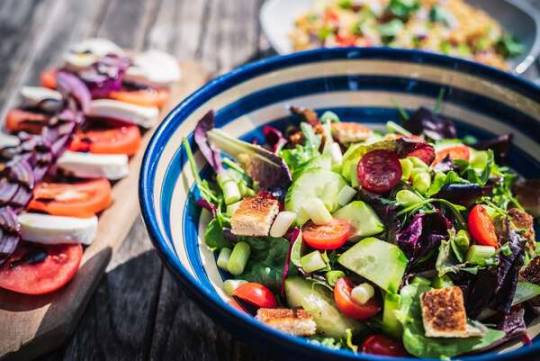
Before diving into the best keto diet food list, let’s briefly understand what the keto diet is. The keto diet involves drastically reducing your carbohydrate intake and replacing it with fat. This reduction in carbs puts your body into a metabolic state called ketosis, where fat, instead of carbohydrates, becomes the primary fuel source.
Benefits of the Keto Diet
The keto diet offers several benefits:
Weight Loss: By cutting down carbs, the body burns fat for energy.
Improved Mental Focus: The brain uses ketones, which are produced during ketosis, as a fuel source, leading to better mental clarity.
Stable Blood Sugar Levels: The keto diet can help manage blood sugar levels, which is beneficial for people with diabetes.
Best Keto Diet Food List
When following a keto diet, choosing the right foods is crucial. Here’s the best keto diet food list to help you stay in ketosis and enjoy a variety of delicious meals.
1. Healthy Fats and Oils
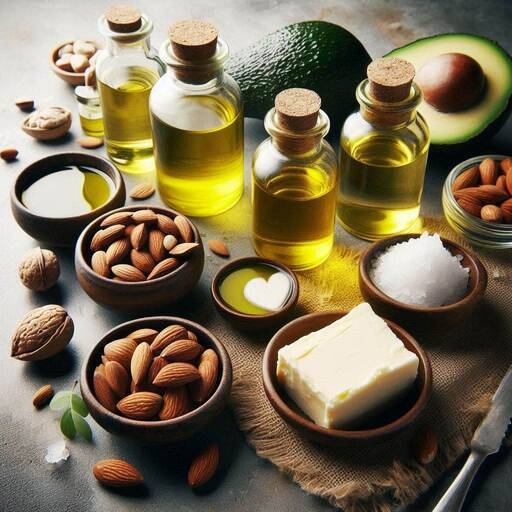
Healthy fats are the cornerstone of the keto diet. Here are some of the best sources:
Avocado Oil: Great for cooking due to its high smoke point.
Olive Oil: Perfect for salads and low-heat cooking.
Coconut Oil: Rich in medium-chain triglycerides (MCTs) that support ketosis.
Butter and Ghee: Ideal for cooking and adding flavor to dishes.
Nuts and Seeds: Almonds, chia seeds, and flaxseeds are excellent sources of healthy fats.
2. Low-Carb Vegetables
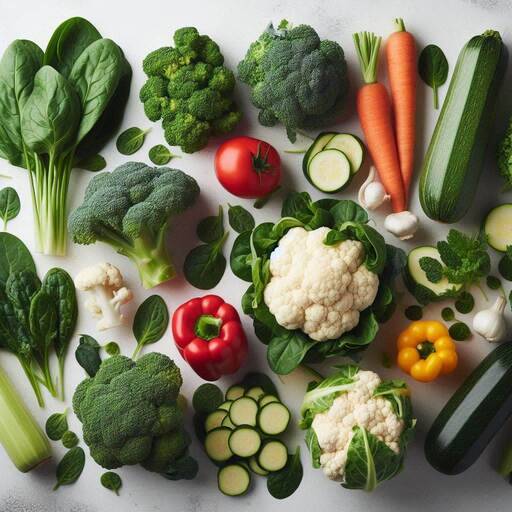
Vegetables are an essential part of the best keto diet food list as they provide fiber, vitamins, and minerals with minimal carbs:
Leafy Greens: Spinach, kale, and arugula are low in carbs and high in nutrients.
Cruciferous Vegetables: Broccoli, cauliflower, and Brussels sprouts are great for keto-friendly dishes.
Zucchini: A versatile vegetable that can be used in place of pasta or as a side dish.
Bell Peppers: Low in carbs and rich in vitamins, making them a tasty addition to any meal.
Mushrooms: Low in carbs and add a meaty texture to dishes.
3. Protein Sources
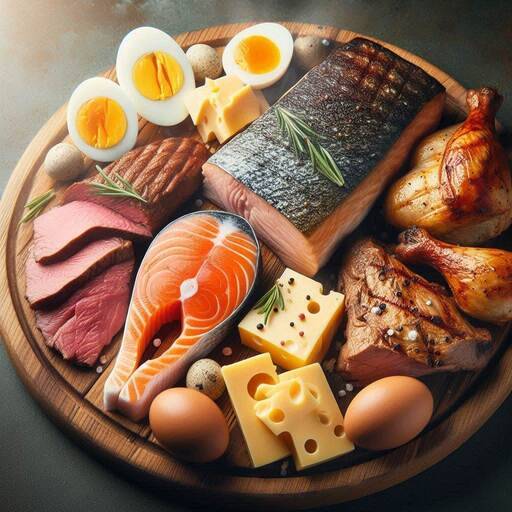
While the keto diet is high in fat, it also includes moderate amounts of protein. Here are some top protein options:
Fatty Fish: Salmon, mackerel, and sardines are rich in omega-3 fatty acids and perfect for the keto diet.
Meat: Grass-fed beef, pork, and lamb provide essential nutrients and are keto-friendly.
Poultry: Chicken thighs and turkey are great for adding variety to your meals.
Eggs: A versatile protein source that can be used in various keto recipes.
Cheese: Hard cheeses like cheddar and parmesan are low in carbs and high in fat.
Think you know the keto diet? Test your knowledge with our interactive quiz! 🧠💪 Find out how much you really know. Take the quiz now.
4. Dairy Products

Dairy products are another key component of the best keto diet food list, providing both fat and protein:
Heavy Cream: Use it in coffee or keto-friendly desserts.
Full-Fat Yogurt: Choose unsweetened versions to avoid extra carbs.
Cream Cheese: A delicious addition to snacks and meals.
Sour Cream: Perfect for adding richness to your dishes.
Butter: A staple in keto cooking, ideal for sautéing and baking.
5. Nuts and Seeds
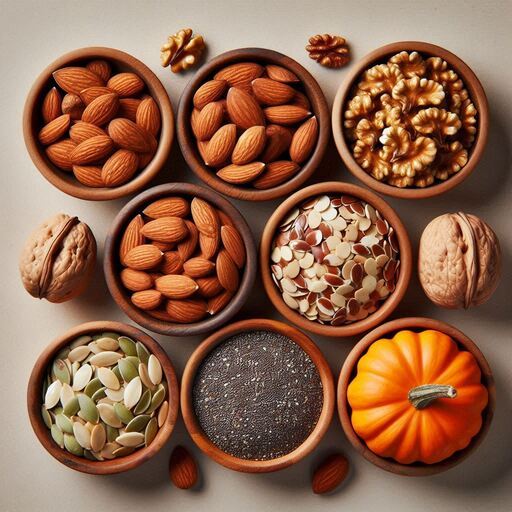
Nuts and seeds are excellent snacks that are high in healthy fats and low in carbs:
Almonds: A great source of vitamin E and magnesium.
Walnuts: Rich in omega-3 fatty acids, perfect for keto.
Chia Seeds: High in fiber and can be used in puddings and smoothies.
Flaxseeds: Excellent for adding to keto-friendly bread and baked goods.
Pumpkin Seeds: A crunchy snack with healthy fats and protein.
6. Berries

While most fruits are high in sugar and carbs, some berries can fit into a keto diet:
Strawberries: Low in carbs and can be enjoyed in moderation.
Raspberries: High in fiber and low in sugar.
Blackberries: Another low-carb berry option for keto dieters.
Blueberries: Best consumed in small quantities due to their higher carb content.
7. Beverages

Staying hydrated is crucial, and there are several keto-friendly drink options:
Water: The best choice for staying hydrated.
Herbal Teas: Unsweetened teas like green tea or chamomile are keto-friendly.
Coffee: Black coffee or with added heavy cream is ideal for the keto diet.
Bone Broth: Provides electrolytes and is perfect for those on a keto diet.
Sparkling Water: Choose unsweetened versions for a refreshing drink.
8. Snacks

The keto diet doesn’t mean you have to give up snacking. Here are some keto-friendly snacks:
Pork Rinds: A crunchy, low-carb snack.
Cheese Crisps: Made from baked cheese, these are a perfect keto snack.
Hard-Boiled Eggs: Simple and nutritious.
Olives: High in healthy fats and low in carbs.
Keto Bars: Low-carb bars specifically made for keto dieters.
Tips for Following the Best Keto Diet Food List
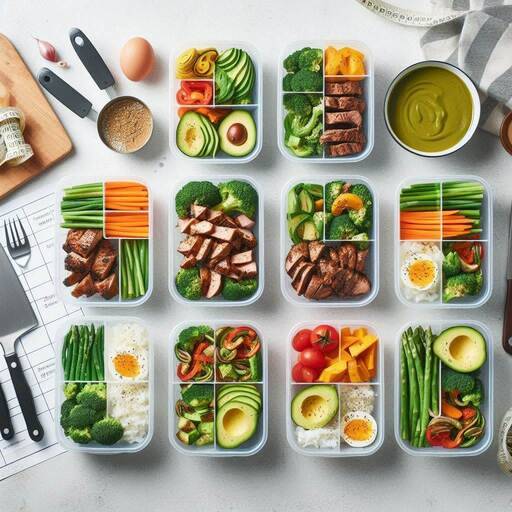
To make the most out of the best keto diet food list, here are some tips:
Meal Prep: Plan and prepare your meals in advance to stay on track.
Read Labels: Always check for hidden carbs and sugars in packaged foods.
Stay Hydrated: Drink plenty of water to support your body during ketosis.
Monitor Macros: Keep track of your fat, protein, and carb intake to ensure you stay within your keto goals.
Think you know the keto diet? Test your knowledge with our interactive quiz! 🧠💪 Find out how much you really know. Take the quiz now.
Conclusion
The best keto diet food list is packed with delicious and nutritious options that will help you succeed on your keto journey. By focusing on healthy fats, low-carb vegetables, quality proteins, and keto-friendly snacks, you can enjoy a variety of meals while staying in ketosis. Remember to plan your meals, stay hydrated, and always read labels to ensure you're sticking to your keto goals.
The ketogenic diet is not just a fad; it's a lifestyle change that can offer numerous health benefits. With the right foods, you can achieve your desired results and maintain them over time.
2 notes
·
View notes